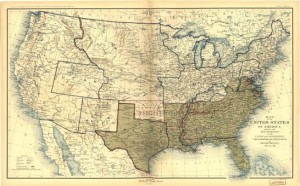 Union General William Tecumseh Sherman, yet headquartered in Chattanooga, is making final preparations for the beginning of his spring campaign against Atlanta. Today he sends a coded telegram ordering the requisition and deployment of a manned gun-boat to “patrol the river below Bridgeport to Decatur to cover McPherson’s movements.” General James B. McPherson commands the right-wing of Sherman’s army. Sherman’s forces are scheduled to move out one week hence.
Union General William Tecumseh Sherman, yet headquartered in Chattanooga, is making final preparations for the beginning of his spring campaign against Atlanta. Today he sends a coded telegram ordering the requisition and deployment of a manned gun-boat to “patrol the river below Bridgeport to Decatur to cover McPherson’s movements.” General James B. McPherson commands the right-wing of Sherman’s army. Sherman’s forces are scheduled to move out one week hence.
While Sherman readies his forces for battle, Southern Baptists continue their focus on the spiritual readiness of Confederate troops. Woefully outnumbered and out-gunned by superior Union armies, the hope of the South, the region’s white Baptists believe, rests with a superior religion. A converted army would assuredly please God enough to turn the tide of this ever so terrible war.
J. D. Hufham, editor of the North Carolina Baptist Biblical Recorder, is doing his best to convert his state’s share of the Confederate Army. If only his home front readers would up their commitment as well.
….We need contributions every week to send the paper to the soldiers. We have been sending a considerable number of copies to them ever since the war began; but we have not been able to supply the demand. Many regiments and hospitals to which we send only ten or twenty copies ought to have fifty or a hundred. It were easy to make this plain by publishing letters we receive, but this is unnecessary. We call the attention of our readers to this fact, hoping that our suggestion will not be in vain.
Confederate hospitals are increasingly filled with injured and ill soldiers, placing an ever greater burden on numerically dwindling southern armies. While most injuries are due to battles, some happen far from the fields of war.
One such injury far from the theater of war takes place today in Quitman, Georgia, in the deep southern portion of the state. Private Willis D. Jones, in the act of lifting baggage off of a train, sustains a serious injury. Trains, quite dangerous, have killed and crippled many a man under the crushing weight of wheels, by derailments, and even by explosions.
Jones is fortunate in that he survives. Indeed, his injury may have also saved his life in the face of the bloody battles that are to come in the months ahead.
Surviving the war, Jones marries, has children, takes a job as a tax collector and becomes a Baptist pastor in Carroll County, Georgia. Preaching in many churches over a number of decades, he also liberally distributes Bibles to area folk. The Civil War veteran and good reverend dies April 17, 1921.
Sources: April 27, 1864 Letter from Wm. D. Whipple, Assistant Adjutant-General, to Major-General Hooker, conveying Sherman’s orders, in United States War Department, Henry Martyn Lazelle, Leslie J. Perry, The War of the Rebellion: A Compilation of the Official Records of the Union and Confederate Armies, Series One, Volume 32, Part Three, p. 511 (link); James B. McPherson (link); “The Army,” Biblical Recorder, April 23, 1864 (link); “Descendants of Thomas Benjamin Jones” (link)


